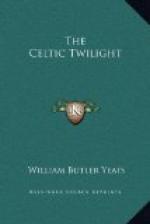I have copied this account of Paddy Flynn, with a few verbal alterations, from a note-book which I almost filled with his tales and sayings, shortly after seeing him. I look now at the note-book regretfully, for the blank pages at the end will never be filled up. Paddy Flynn is dead; a friend of mine gave him a large bottle of whiskey, and though a sober man at most times, the sight of so much liquor filled him with a great enthusiasm, and he lived upon it for some days and then died. His body, worn out with old age and hard times, could not bear the drink as in his young days. He was a great teller of tales, and unlike our common romancers, knew how to empty heaven, hell, and purgatory, faeryland and earth, to people his stories. He did not live in a shrunken world, but knew of no less ample circumstance than did Homer himself. Perhaps the Gaelic people shall by his like bring back again the ancient simplicity and amplitude of imagination. What is literature but the expression of moods by the vehicle of symbol and incident? And are there not moods which need heaven, hell, purgatory, and faeryland for their expression, no less than this dilapidated earth? Nay, are there not moods which shall find no expression unless there be men who dare to mix heaven, hell, purgatory, and faeryland together, or even to set the heads of beasts to the bodies of men, or to thrust the souls of men into the heart of rocks? Let us go forth, the tellers of tales, and seize whatever prey the heart long for, and have no fear. Everything exists, everything is true, and the earth is only a little dust under our feet.
BELIEF AND UNBELIEF
There are some doubters even in the western villages. One woman told me last Christmas that she did not believe either in hell or in ghosts. Hell she thought was merely an invention got up by the priest to keep people good; and ghosts would not be permitted, she held, to go “trapsin about the earth” at their own free will; “but there are faeries,” she added, “and little leprechauns, and water-horses, and fallen angels.” I have met also a man with a mohawk Indian tattooed upon his arm, who held exactly similar beliefs and unbeliefs. No matter what one doubts one never doubts the faeries, for, as the man with the mohawk Indian on his arm said to me, “they stand to reason.” Even the official mind does not escape this faith.
A little girl who was at service in the village of Grange, close under the seaward slopes of Ben Bulben, suddenly disappeared one night about three years ago. There was at once great excitement in the neighbourhood, because it was rumoured that the faeries had taken her. A villager was said to have long struggled to hold her from them, but at last they prevailed, and he found nothing in his hands but a broomstick. The local constable was applied to, and he at once instituted a house-to-house search, and at the same time advised the people to burn all the bucalauns




